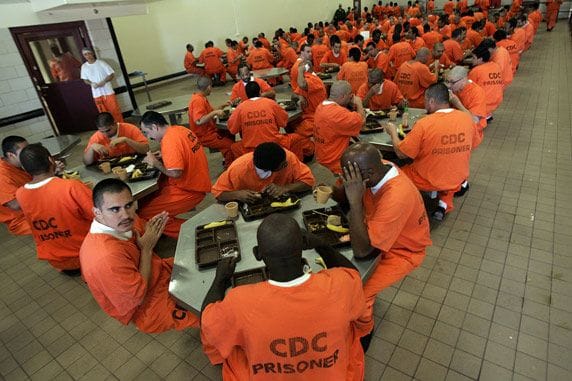Supreme Court: California must release inmates to relieve overcrowding


Late last year, we reported on the appeal of Schwarzenegger v. Plata to the Supreme Court where oral arguments were heard. In the lawsuit, a special panel of three federal judges ruled that California would have to address its rampant prison overcrowding by releasing tens of thousands of inmates, citing the appalling conditions of the state's crowded prison system as a violation of inmates' 8th Amendment right not to suffer "cruel and unusual punishments."
On Monday, the high court issued a 5-4 opinion, Brown v. Plata, upholding the federal panel's earlier decision as necessary to remedy the overcrowding that endangers the lives and health of California's prison population. In their decision, the special panel described prison conditions accordingly:
"In these overcrowded conditions, inmate-on-inmate violence is almost impossible to prevent, infectious diseases spread more easily, and lockdowns are sometimes the only means by which to maintain control. In short, California’s prisons are bursting at the seams and are impossible to manage."
Writing for the majority in Monday's Supreme Court ruling, Justice Anthony Kennedy argued that these conditions fail to meet "minimum constitutional requirements" for the inmate population's health and safety. The high court's four "conservative" justices dissented, but split over their legal reasoning for doing so. Bush appointees, Alito and Chief Justice Roberts argued that "the ruling conflicted with a federal law intended to limit the power of federal judges to order a release of prisoners." The court's older justices, Scalia and Thomas, argued that the court order would wreak havoc and threaten public safety, with Scalia writing that "terrible things are sure to happen as a consequence of this outrageous order."
But what would happen without a reduction in California's crowded prison population? Is it possible that this could cause terrible things to happen as well? David Fathi, Director of the ACLU's National Prison Project argues that:
"Our public safety is jeopardized by overcrowded prisons, in which high-risk prisoners don't rehabilitate and low-risk prisoners learn new criminal behavior. It is far past time to abandon failed 'get-tough' ideologies and invest in policies that are rooted in evidence, fiscal prudence and common sense."
It's also curious to hear the high court's two strict constructionists, Justices Antonin Scalia and Clarence Thomas, considering the effects of policy-making instead of simply interpreting the law as written. If they were going to dissent at all, it would have made more sense for their dissent to follow the lines of the Bush appointees' opinion by interpreting and applying the law, rather than ruling on the basis of policy outcomes that they think might be unfavorable. Isn't that strict constructionism?
Perhaps more curious, is that despite the high court's sharp split over Brown v. Plata, it was nearly unanimous in its Kentucky v. King decision just a week earlier, which "gave police more leeway to break into homes or apartments in search of illegal drugs when they suspect the evidence otherwise might be destroyed." In an 8-1 decision, the only dissenter, Justice Ruth Bader Ginsburg wrote:
"The court today arms the police with a way routinely to dishonor the Fourth Amendment's warrant requirement in drug cases. In lieu of presenting their evidence to a neutral magistrate, police officers may now knock, listen, then break the door down -- never mind that they had ample time to obtain a warrant. I dissent from the court's reduction of the Fourth Amendment's force."
How do the majority in Brown v. Plata expect California to reduce unconstitutional prison overcrowding when just one week before ordering it to do so, all of them except for Ginsburg granted California police more power to arrest and imprison more citizens for the non-violent crime of drug possession? Not to mention upholding the Fourth Amendment, perhaps to ease California's unconstitutional prison crowding, the majority in Plata could have issued a ruling last week that bars police from "knocking, listening, and breaking the door down" to round up and imprison non-violent offenders.
And do Plata's dissenters, who all unanimously ruled in favor of Kentucky last week, honestly expect states like California to continue accomodating their present prison populations at levels far above capacity, while continuing to add even more inmates for non-violent drug offenses? Could "terrible things" happen as a consequence of Scalia's ruling in Kentucky v. King, which stacks the prison system with ever more non-violent offenders who then become hardened, recidivistic criminals, and which taxes the system to its breaking point, causing the very early release orders that Scalia fears and discourages?
These two Supreme Court rulings might just be a perfect, jurisprudential microcosm of the laws, policies, and attitudes that continue to exacerbate prison overcrowding in California.



